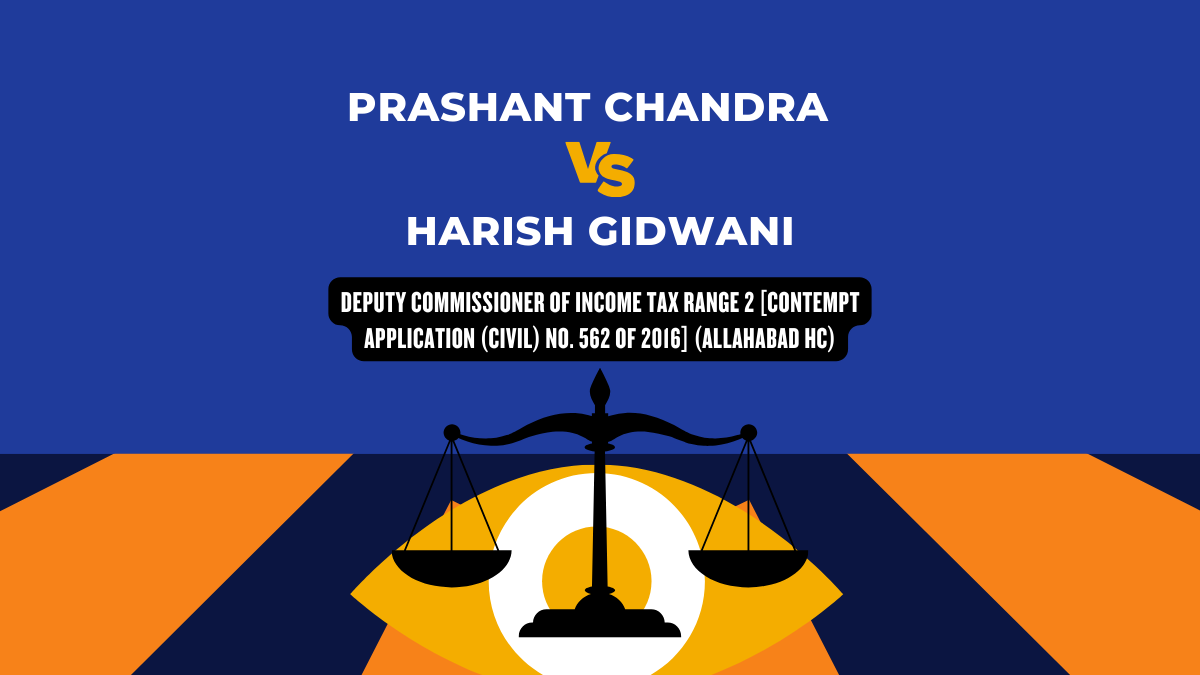Prashant Chandra vs Harish Gidwani Deputy Commissioner of Income Tax Range 2 [Contempt Application (Civil) No. 562 of 2016] (Allahabad HC)
The present application for contempt under Section 12 of the Contempt of Courts Act, 1971 had been submitted, claiming intentional and deliberate non-compliance with the judgment and order dated March 31, 2015, issued by a Division Bench of the Allahabad Court, which contained the following directive: –
An examination of Annexure SA-3, which was attached to the supplementary affidavit dated March 31, 2015, revealed that in response to the notice dated November 3, 2014, the petitioner submitted a written objection to the Assessing Officer. This objection highlighted the ongoing status of the aforementioned writ petition and indicated that Section 127 was not applicable in any manner.
Consequently, it was essential for the income tax authority to await the resolution of the writ petition. However, they proceeded with the matter, demonstrating a prejudicial and biased stance on the part of the authority. It was important to emphasize that transparency and fairness are fundamental principles of state action.
Consequently, it was anticipated that the authorities will act in a methodical manner, ensuring that no uncertainty arises in the minds of the assessee. As previously stated, it was the responsibility of the Assessing Officer to refer the matter of jurisdiction to the Chief Commissioner or the Commissioner, as applicable, in accordance with sub-section (2) of Section 124 of the Act. The failure to do so has compromised the validity of the subsequent proceedings.
In this instance, there was a total deviation from the established procedure. The records indicated that when the petitioner declined to acknowledge the jurisdiction of the Assessing Officer in Lucknow, the Income tax authority acted ex parte and issued a demand amounting to nearly INR 52 lacs.
It was important to reiterate that the notice dated September 11, 2013, which was generated by computer, distinctly showed that the petitioner’s Delhi address was crossed out and a local address was handwritten in its place.
Therefore, it was incorrect to say that the Delhi Address was not in the knowledge of the respondents and the Hon’ble High Court found force in the submissions of the petitioner that local address was inserted deliberately to create jurisdiction, which, in fact, legally was not vested with the income tax authority.
Therefore, the income tax authority exceeded its jurisdiction, which not only vitiates the impugned show cause notice but the entire proceeding.
Under these conditions, the entire proceeding was deemed ab initio illegal, lacking jurisdiction, and contravening Section 143(1)(a) of the Income-tax Act. It was important to highlight that, despite the Court’s directives indicating that the Lucknow authority lacked the jurisdiction to commence proceedings under the Income Tax Act against the petitioner, the income tax authority continued to issue notices and manually altered the address of the assessee on these notices from Delhi to Lucknow.
Given these circumstances, the Hon’ble High Court was of the view that imposing only a fine would fail to serve the interests of justice. The Income tax authority held a senior position and was responsible for the assessment of the applicant. His actions were extremely inappropriate, and if they were to escape punishment, it would convey a misleading message to other officials within the Income Tax Department. Such conduct would be perceived as merely warranting a warning or a fine, especially considering the numerous cases before the courts where orders were issued.
The Hon’ble High Court thereby imposed a fine of INR 25,000 along with imprisonment for a period of one week on the contemnor-the income tax authority. In case of default, they would further suffer one day’s imprisonment.
To Download the official order, click here.
Prashant Chandra vs Harish Gidwani Deputy
“The site is for information purposes only and does not provide legal advice of any sort. Viewing this site, receipt of information contained on this site, or the transmission of information from or to this site does not constitute an attorney-client relationship. The information on this site is not intended to be a substitute for professional advice.”

